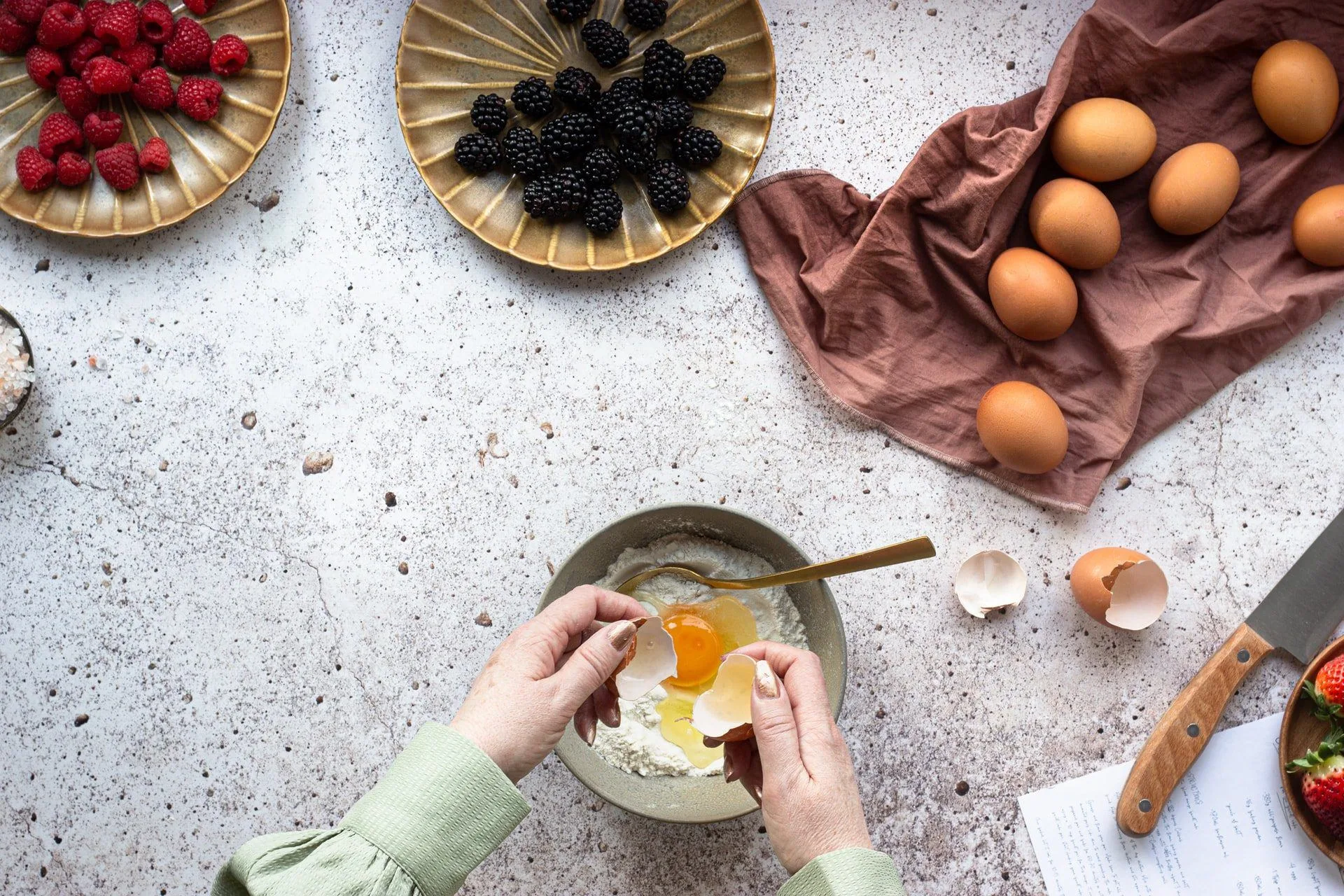A breakfast staple, a quick lunch on-the go, a reliable ingredient at dinnertime – eggs are celebrated for their protein content, heart-healthy fats, and an array of vitamins and minerals, like vitamin D and vitamin B12. But there’s another nutrient hidden within the golden yolk that deserves some spotlight: lutein.
Eyes Open on Lutein
Lutein is a type of carotenoid, a naturally occurring pigment that gives foods like egg yolks, spinach, and carrots their vibrant colors. Beyond its role in adding a beautiful hue to your meals, lutein is essential for maintaining healthy eyes, as research continues to show. It’s also known for its antioxidant properties, which help protect cells from damage, particularly in the eyes.
Our eyes are exposed to light, which can cause oxidative stress over time. Lutein acts as a natural sunblock, absorbing harmful blue light that can damage the retina.
This helps maintain healthy vision and may reduce the risk of age-related macular degeneration (AMD), the leading cause of blindness in older adults.
Interestingly, the body cannot produce lutein on its own, so it’s essential to get it from your diet.
Crack An Egg For Lutein
Eggs are one of the few foods that contain lutein in a highly absorbable form. While leafy greens like spinach and kale are often praised for their lutein content, the lutein in eggs is more bioavailable, meaning your body can absorb and use it more effectively.
A single large egg yolk has about 250 micrograms of lutein, and the healthy fats naturally present in eggs help bump up the absorption of lutein.
This is why including eggs in your diet can significantly contribute to your daily lutein intake, with a double win from lutein together with healthy fats in one package.
But lutein isn’t just good for your eyes. Scientists also think that it may be helpful for brain health. Lutein is found in high concentrations in the brain, especially in areas associated with cognitive function. Studies have shown that higher lutein levels in the brain are associated with better cognitive performance in older adults. This suggests that lutein may help keep your mind sharp as you age.
Getting Enough Lutein
So how can you ensure you’re getting enough lutein? One of the easiest ways is by eating eggs regularly. Whether you prefer them scrambled, poached, or hard-boiled, incorporating eggs into your diet can help support eye and brain health, along with other benefits like lowering our risk of lifestyle diseases and managing a healthy weight.
The lutein in the yolk is yet another compelling reason to make whole eggs a part of your regular diet. So next time you crack open an egg for breakfast, remember, you’re doing your eyes and brain a favour.
Eye-Friendly Egg Recipes
Here’s a healthy egg based recipe to help enhance your vision.
Giant Rösti with Baked Eggs and Avo
Serves 4
Preparation time: 20 minutes
Cooking time: 40 minutes
Cost per recipe: Serves 4 for under R100
Ingredients:
- Salt and pepper
- 1 kg potatoes, coarsely grated (with skin)
- Canola oil for cooking
- 4 eggs
- 5 ml (1 tsp) mustard (like Dijon)
- juice of 2 lemons
- 2 avocados
- 1 tomato, chopped
- Handful coriander, chopped
Method
- Preheat oven to 200 °C. Grease a 30 cm x 40 cm baking dish. Mix 10 ml (2 tsp) salt through the potatoes. Set aside for 5 minutes.
- Squeeze the excess liquid out of the potatoes, then mix through 30 ml (2 tbsp) oil. Scatter (don’t press) into the prepared dish. Roast for about 30 minutes, or until golden and crispy.
- Break eggs on top of the rösti and bake for about 10 minutes for runny yolks or until cooked to your liking.
- Meanwhile, make the dressing by blitzing together the mustard, 30 ml (2 tbsp) of the lemon juice, 60 ml (¼ cup) oil and ½ an avocado. Season with salt and pepper.
- Make a salsa by chopping ½ an avocado and mixing it with tomato, coriander and the remaining lemon juice. Season with salt and pepper.
- Serve the rösti topped with the salsa, dressing and remaining avocado, sliced.
References
- This recipe was chosen from a selection of recipes by the South African Poultry Association.
- Johnson, E. J. (2021). Lutein and Zeaxanthin in Eye and Cognitive Health. Advances in Nutrition, 12(1), 75-85. doi:10.1093/advances/nmaa114
- Ma, L., & Zhang, Y. (2020). Protective Effect of Lutein on the Development of Retinal Degenerative Diseases: A Review. Nutrients, 12(6), 1721. doi:10.3390/nu12061721
- Stringham, J. M., & Stringham, N. T. (2020). Plasma Carotenoids and Their Relationship to Cognition and Brain Health. Nutritional Neuroscience, 23(8), 549-560. doi:10.1080/1028415X.2018.1554146
- Tanaka, T., & Shibata, R. (2022). The Role of Dietary Lutein and Zeaxanthin in Eye Health: A Review of Current Evidence and Implications for Future Research. Journal of Clinical Medicine, 11(1), 173. doi:10.3390/jcm11010173
Main photo credit: Unsplash



![women [longevity live]](https://longevitylive.com/wp-content/uploads/2020/01/photo-of-women-walking-down-the-street-1116984-100x100.jpg)










